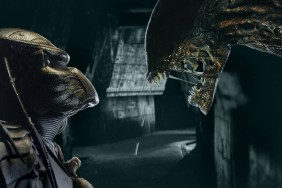
Heaving muscles, strong-wills and deep bonds were the guts of 1980s action films. Films like First Blood (1982) and Commando (1985) were becoming wildly popular among male audiences and as the 80s progressed, these notions of masculinity were assimilated into a wide variety of sub-genres that began to infiltrate the film landscape. Men in films had always been tough, from Humphrey Bogarts apathetic exterior to Clint Eastwoods stoicism; men have been leaders, lone-wolves and ultimately the characters making the best and most noble decisions in their respective films. The 80s saw a sharp rise in physical prowess in these characters. Yes they were still strong and right and good, but they had muscles to back it up.
While there are several theories in regard to the rise of this hyper-masculinity, I think there was a cultural shift in the 70s that had been in motion since the Second World War. Women were becoming increasingly independent and contributing just as much to society as men, therefore equality (aka feminism) was in order. And while the action films dont eschew feminism outright, they continually assert that men are physically and emotionally strong. So, when a supernatural or extraterrestrial villain comes knocking at your door, youre going to want some man power.
James Camerons Aliens (1986) may be one of the most influential contemporary films ever made. Its both terrifying and funny, with action scenes that drive the plot forward and reveal character. It also brought in the army. While Ridley Scotts 1979 film Alien plays more like a haunted house film, Cameron upped the premise with the introduction of the most highly trained elite marine units in the universe to accompany Ripley (Sigourney Weaver) on her second battle with the Xenomorphs. Under the guise of a rescue mission, the Marine Corps unit accompanies Ripley and a sleazy executive from the Weyland Yutani Corporation to check on the status of a colony thats had some run-ins with aliens. While the aliens quickly wipe out most of the unit, leaving several plucky characters left, the tools at their disposal are that of the marines. In one of the most romantic moments of the film, Corporal Hicks shows Ripley how to handle one of the larger guns. Though Ripley is initially wary of the marines and their methodsespecially after the discovery of Newt, a young girl who has survived on her own with no helpshe soon realizes that hiding from the aliens is no longer an option. She has the opportunity to hurt them and avenge the deaths of her friends and save her new de facto family. Donning a rather impressive exosuit adding to her height and strength to fight the Queen Alien, Ripley takes on the physically masculine traits that the marines boasted. While Ripley has become a feminist icon, she still transforms into an imposing masculine figure, which gives her the strength to face her greatest fear.

Predator (1987) may be one of the most perfectly crystallized examples of hyper-masculinity in genre films; from Dutchs (Arnold Schwarzenegger) repeated cries of get to tha choppah! to arm wrestling as a form of greeting, John McTiernans film fully embraces the muscle-bound survivor scenario. When Dutchs elite team of operatives is dispatched to rescue a cabinet minister in the jungles of Central America, theyre greeted by more than they bargained for. An extraterrestrial repeatedly attacks the team, leaving Dutch to take a final stand and fight against a seemingly unbeatable enemy. Like Ripley, Dutchs last stand is not only fraught with action and tension, but also revenge, and the possibility of preventing the threat from spreading. The men on Dutchs team are lured away by the Predator throughout, and just like any slasher, this means certain death. The male characteristics that I outlined earlier begin to dissipate the longer the crew is in the jungle. While they easily defeat a drug cartel, the more isolated they are, the wearier and more trigger happy they become. Dutch is of course the sole survivor, and while hes stripped of his masculine trappings, hes able to call upon his true inner masculinity rather than the performative elements (guns, cigars etc) of it. Dutch is able to beat the Predator utilizing his primordial animal instincts. Predator tells us that true masculinity can win out against heinous odds and is the ultimate form of power. While man-made instruments can get rid of a drug cartel, you need character to beat an intergalactic alien.
As the 90s progressed, the hyper-masculine trend and its hybrids began to die out. It seemed too dated and unrelatable. Both genders were continually fighting to express themselves freely and safely, so being bound by muscles wasnt much of a priority. Well, until Y2K and the Devil rolled around.

Peter Hyams End of Days (1999) is the answer to anyone who thought the world is going to hell in a hand basket with all this progressive nonsense. End of Days gets its morals straight from the medieval era as Family, God and Penance make up its core values. Jericho (Schwarzenegger) is a depressed former cop who left the force after his wife and daughter were murdered. Now working for a security and protections company, he becomes entangled in a plot in which the Devil (Gabriel Byrne) hopes to impregnate a young woman (Robin Tunney) in the hour before the new millennium begins.
Stopping the Devil should be an easy enough choice; he is, after all, the embodiment of evil. But as this is the start of the new millennium, End of Days sees Jericho frequently question why exactly he should, as God allowed his family to die. Well, Jericho is told repeatedly that the world as we know it is worth saving and that perhaps well all meet our loved ones on the other side. The Devils over-sexualized, effete nature is in stark contrast with Jerichos pain and solitude. Theres little clarity as to Jerichos ultimate change of heart when he finally does decide to confront the Devil, but throughout the film they are positioned in direct opposition. So, the final showdown seems to be less about protecting the world and what we know to be good than not allowing someone with the Devils values to win.
The hyper-masculinity in these films serves to maintain the status quo. Were told that the masculinity which we have internally or can take on (as Ripley does) is enough to defeat the threatening forces which could harm the world as we know it. These films have served to help maintain the worlds that are being protected and our expectations of what makes a man. At the beginning of the new millennium, we saw films like Resident Evil (2002) and Underworld (2003) each featuring a highly trained and skilled female protagonist. In the respective films, shes not saving the world as we know it however, shes venturing into new, uncharted territories. The hyper-masculinity which reached its peak in the 80s rapidly declined because of its rigidity. Those films saw little room for deviance from the expected norm, which eventually led to their downfall.
—-
Alexandra West is a freelance horror journalist who lives, works, and survives in Toronto. Her work has appeared in the Toronto Star, Rue Morgue, Post City Magazine and Offscreen Film Journal. In December 2012, West co-founded the Faculty of Horror podcast with fellow writer Andrea Subissati, which explores the analytical side of horror films and the darkest recesses of academia.








